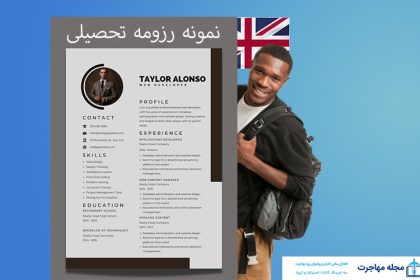As one of the popular destinations for study and professional training, Germany attracts many students and interns from all over the world every year. There are two main routes for educational and educational immigration to Germany: the Ausbildung visa and the study visa. Each of these visas has its own conditions, advantages and disadvantages, and in this article, we will comprehensively review the important differences between these two types of visas.
Definition of Osbilding visa and study visa
Osbilding and study visas are both issued for educational and professional purposes, but there are significant differences in their nature and applications. The Ausbildung visa is specifically for people who plan to attend vocational training courses and internships in Germany, while the study visa is issued for those who plan to continue their studies at universities and educational institutions. In this section, we will examine the exact definition of each of these visas and the key differences between them to gain a better understanding of the requirements and opportunities associated with each type of visa.
Osbilding visa
Osbilding visa or German trainee visa is issued to people who plan to participate in a vocational training course (dual training). This type of training includes a combination of theoretical courses in professional schools and practical training in companies and industrial institutions.
Study visa
German study visas are issued to people who intend to study in German universities or higher education institutions. This visa allows students to participate in undergraduate, master’s or doctoral courses.
How to get a study visa: German study visa
Entry and acceptance conditions
The entry and admission requirements for the Ausbildung visa and the study visa have different requirements and processes. The Osbilding visa, which is issued specifically for vocational training and apprenticeships in Germany, requires proof of acceptance from a German educational institution and the financial ability to cover living expenses. On the other hand, a study visa is issued to continue studying in universities and higher education institutions, and its conditions usually include providing proof of admission from the university, financial ability, and proficiency in the relevant language. In this section, we will review the entry and admission requirements for both types of visas to provide a detailed overview of the requirements and steps required for each.
Osbilding visa
- Admission to an Osbildung course: You must first be accepted by a German company or institution.
- Language qualification: You usually need a German language qualification of at least level B1 or B2.
- Internship contract: You must sign an internship contract with the desired company.
- Funding: You must prove the financial ability to cover the costs of living in Germany.
Study visa
- University admission: You must be admitted to a German university or higher education institution.
- Language certificate: depending on the language of the course, you need a German language certificate (level B2 or C1) or English language certificate (such as TOEFL or IELTS).
- Funding: You must prove that you have the financial ability to cover the costs of living and studying in Germany. This amount in 2024 is about 11,208 euros per year.
Educational structure and content
The structure and educational content associated with the Osbildung visa and the study visa are significantly different, and each responds to the specific needs of immigrants. An Osbilding visa, issued for vocational training and apprenticeships in Germany, focuses on learning practical skills and work experience in a specific profession and usually includes technical and practical training in the workplace. On the other hand, the study visa is issued for studying in universities and higher education institutions and is dedicated to scientific and academic courses with a focus on theories, research and specialized analysis. In the following, we will examine the structure and educational content of each of these visas and analyze the main differences between practical and academic training courses.
Osbilding visa
- Combination of theory and practice: Osbilding courses include theoretical training in professional schools and practical training in companies.
- Duration: Usually takes 2 to 3.5 years.
- Salary: During Osbilding, interns receive a salary that can cover part of their living expenses.
Study visa
- Theoretical education: The main focus is on theoretical education in universities and higher education institutions.
- Duration: Bachelor’s (3-4 years), Master’s (1.5-2 years), and PhD (3-5 years) courses last.
- Salary: Students usually do not receive a salary unless they are employed as a research or teaching assistant.
Costs and financial support
Costs and financial support for job-building visas and study visas are both important factors in immigrants’ decisions to pursue further education and vocational training. Ausbildung visas, issued for vocational training and apprenticeships, usually have relatively lower costs, and part of the costs may be covered by employers or educational institutions. In contrast, a study visa issued for university and higher education courses usually comes with higher costs and requires more careful financial planning. In this section, we will review the fees for both types of visas to provide comprehensive guidance for financial management and academic planning.
Osbilding visa
- Living expenses: Interns must cover their own living expenses, but the salary can cover some of these expenses.
- Tuition fees: Osbilding courses are usually free and no tuition fees are charged.
Study visa
- Tuition fees: German public universities usually charge no or low tuition fees for international students, but private universities do.
- Living expenses: Students must cover their living expenses and can use scholarships and grants.
You can contact our experienced consultants at the Caspian immigration office at any hour of the day and night for free and ask your questions and doubts for more information on the details of these costs and the financial support available in the building and study visa. Contact us through the consultation request form or the numbers listed on the “Contact Us” page.
Job opportunities after completing the course
Job opportunities after completion of the course for an Ausbildung visa and a study visa depend significantly on the type of education and experience one has acquired. An Ausbildung visa, issued for vocational training and apprenticeships, usually leads to direct employment opportunities in the industry and profession in which the individual trained. This visa allows trainees to easily enter the labor market after completing the course. In contrast, a study visa for university and higher education courses gives graduates the opportunity to specialize in their academic and research fields and may provide more diverse career opportunities in different fields, including research and teaching. In the following, we will examine the job opportunities after completing the training courses related to both types of visas.
Food industry engineering in Germany: studying food industry in Germany
Osbilding visa
- Labor market: Graduates of Osbilding courses have good job opportunities in Germany due to their high practical experience and professional training, and generally they will be hired directly after completing a successful and efficient training course.
- Work visa: After completing the Osbilding course, they can get a work visa and work full-time.
Study visa
- Labor market: University graduates will also have good job opportunities, especially in the fields of research and science.
- Job-seeking visa: After completing the course, students can get an 18-month job-seeking visa to find a suitable job.
Advantages and disadvantages
Business-building and study visas each have their own advantages and disadvantages, which vary depending on individual goals and professional needs. An Ausbildung visa, issued for vocational training and apprenticeships, offers many benefits, including direct hands-on industry experience and the chance of faster employment, but may have educational restrictions. In contrast, a study visa for university and higher education courses allows a person to have a deeper academic education and access to a wider range of career opportunities, but usually comes with higher costs and longer study time. In the following, we will analyze the advantages and disadvantages of each of these visas in order to gain a better understanding of choosing the most appropriate option for educational and professional migration.
Ausbildung visa benefits
- Receive salary during the course
- Gain practical and professional experience
- Good job opportunities and faster entry into the labor market after completing the course
Disadvantages of Osbilding visa
- German language certificate required
- Restrictions on choosing courses
Study visa benefits
- Many research and scientific opportunities
- The possibility of studying in various fields
- Using scholarships and grants
Disadvantages of study visa
- Higher costs of living
- Need to finance living expenses
final word
Choosing between an employment visa and a study visa depends on your professional goals, financial ability, and personal interests. Osbilding courses are suitable for those looking for practical experience and quick entry into the job market, while study visas are more suitable for those looking for university studies and research opportunities. Considering your circumstances and goals, you can choose the best path for your future.
More information in the following articles:
Studying in Germany with a low average
RCO NEWS
















